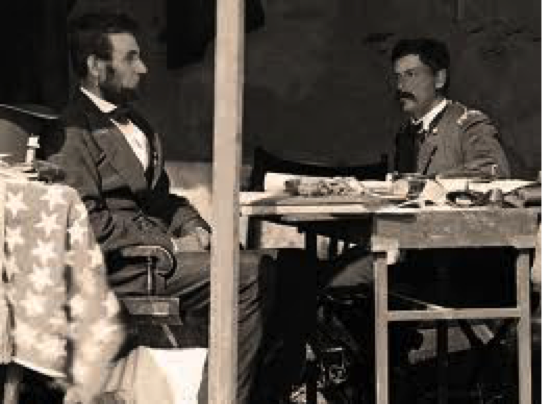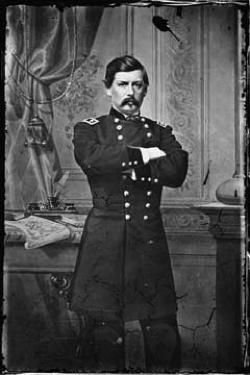I may have mentioned before that I love history and consider myself a bit of an amateur historian (emphasis on amateur). I am fascinated by the Civil War era and turn of the century (19th to 20th) American history. It’s fun to sprinkle tidbits of historical references in my fictional writing. In The Pharm House, Nicholas and Don, also students of history, use the symbolism of Civil War events as an allegorical reference to one of their current situations.
“A collection of twelve original letters from Abraham Lincoln to his generals during the Civil War. Including some to Sherman and Grant. And one to McClellan, telling him to get off his ass and attack Lee.” Don went on, fascinated with his story. “Of course, he (McClellan) didn’t move his ass and Lincoln fired him.”
“Only to bring him back after Hooker lost at Antietam.” Nicholas added.
“Very good Dr. Harding. But alas, it was a short-lived return engagement. Lincoln was forced to re-fire Little Mac when he returned to passive form and refused to move his Army. Tell me Dr. Harding, what do you think of General McClellan?”
“I’ve always thought him one of the most fascinating characters of the Civil War, yet relatively little has been written about him. After all, at the age of 35, he gained command of the most powerful army on Earth and then proceeded to do absolutely nothing with it.” Nicholas expounded.
“And went on to become?” Don inquired gleefully knowing he had a playmate of equals on the topic.

What did Major General George B. McClellan (above on the right) go on to do after the Civil War?
A little background, then I’ll let Nicholas and Don Marshall give you the answer. McClellan and Lincoln shared a common background prior to the Civil War. McClellan was a previous Vice-President of the Illinois Central Railroad and Lincoln, who was actually our first corporate lawyer president, was a prior legal counsel for the Illinois Central Railroad. The two men’s paths likely crossed during their corporate stent with the Railroad.
“And went on to become?” Don inquired gleefully knowing he had a playmate of equals on the topic.

“A losing presidential Democratic candidate against Lincoln in 1864 and then elected Governor of New Jersey in 1877.” Nicholas replied. “Though few know that. In fact, few probably remember who McClellan was.”
An example of how a touch of history can be weaved into a fictional story. You’ll have to read The Pharm House to see how Nicholas and Don use the story of General McClellan in reference to their situation and to see how other historical references are weaved into the story.
